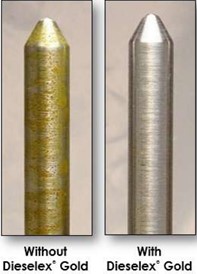 Steel rods used in National Association of Corrosion Engineers (NACE) test to determine effectiveness of corrosion inhibitors.
Steel rods used in National Association of Corrosion Engineers (NACE) test to determine effectiveness of corrosion inhibitors.
The U.S. Environmental Protection is responsible for keeping an eye on the integrity of underground fuel storage tanks (USTs) and the potential for leaks. Until recently, the risk of corrosion in diesel fuel storage tanks was considered minor. When it does occur, it is typically found in situations with water present in a wetted layer in the lower portion of the tank.
Recently, however, UST owners have begun reporting new incidents of severe and rapid corrosion in the upper portions of their metal underground tanks. While corrosion is expected when water is present at the bottom of the tank, historically it has been highly unusual to see corrosion in the upper portion of the tank. Something changed.
In 2014, the EPA started conducting research to try and determine how serious and widespread this issue was becoming. They selected a diverse group of 42 diesel fuel storage tanks for inspection and found that 35 of the 42 (83%) tanks showed moderate to severe corrosion of metal components. Ultimately, the widespread increase in corrosion was attributed to the introduction of Ultra-Low Sulfur Diesel fuel.
Even though the EPA study was conducted on USTs, there are implications for farm operations with above-ground fuel tanks. As the result of changes in our fuel composition, above ground tanks have been experiencing similar problems with corrosion. It’s not only a problem for the integrity of the tank, but it can create loose particles that can block filters and/or cause damage to injectors or fuel pumps. Meanwhile, corrosion as a result of water on tank bottoms is still a concern, too.
The best way to minimize the risk of corrosion is to follow good fuel quality management practices. Tanks should be inspected regularly to identify and remove excess water. Utilizing pre-vent caps to cut down on moisture from condensation and purchasing an additized diesel fuel, such as FS Dieselex Gold, can make a difference, too.
Dieselex Gold is formulated with two components that help in controlling moisture to keep tanks drier for longer periods. It also contains a corrosion preventative that helps protect metal exposed to water or condensation from corroding.
Water and corrosion in your tank can cause major problems. If you are regularly plugging filters or suspect water in your fuel tank, call your local FS Energy Specialist. They are equipped with the tools to identify problems and provide economical solutions to keep your operation running smoothly.